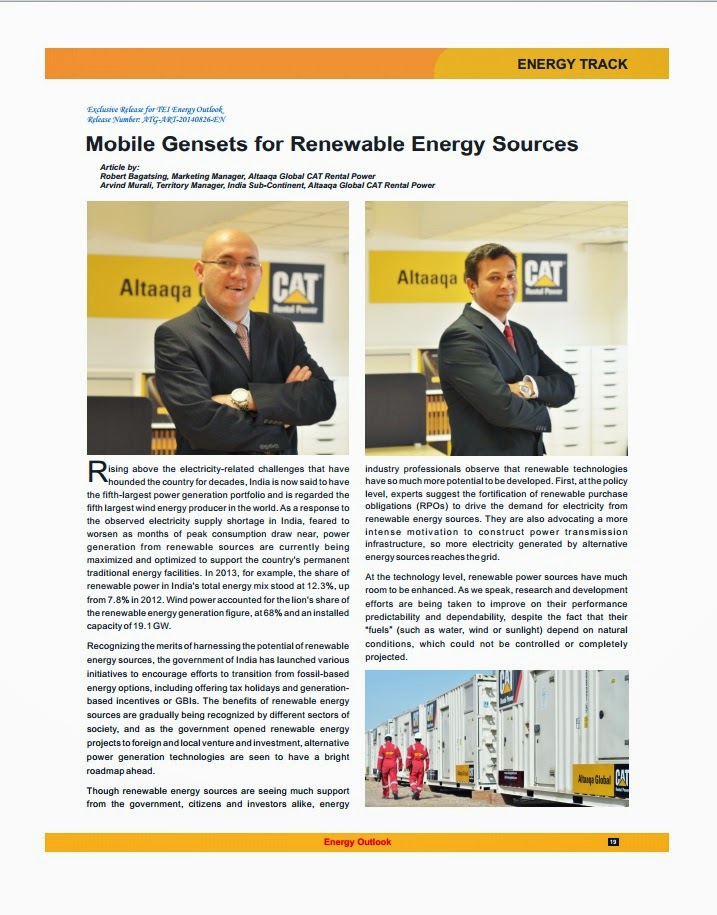DUBAI – Altaaqa Global Caterpillar Rental Power, a leading global temporary power solutions provider, and Caterpillar Inc. have developed a solution to one of Cameroon’s biggest challenges: reliable energy access. This solution is not only about transferring power but also knowledge and prosperity across the African country.
In 2015, Altaaqa Global installed a 50 MW natural gas power plant in Cameroon’s most populous city, Douala, as an immediate solution to the city’s chronic electricity shortage. The power plant added reliable power to Cameroon’s grid, and provided its people and industries with a new, reliable source of electricity.
Just as important as the power was ensuring a local team of highly trained professionals was able to oversee the operation of the power plant. Altaaqa deployed Caterpillar University, Caterpillar’s proprietary training platform, to launch a Customer Development Program. The pilot program, which will continuously run for one year, is offered to a team of select local engineers and technical professionals from Altaaqa Global’s client Eneo, Cameroon’s integrated utility provider.
The Customer Development Program
One of the key pillars of Altaaqa Global's sustainable business model is extending employment and learning opportunities to local communities where it has projects, with the aim of enhancing their skills and transferring world-class industry knowledge to the local workforce.
To facilitate the transfer of knowledge and skills to Eneo’s team of local engineers and professionals, Altaaqa Global launched a tailored customer training program, in cooperation with Caterpillar University.
The program features three methods of instruction: classroom teaching, online instruction and on-the-job mentoring with Altaaqa Global’s Cat-certified in-house technicians. To encourage a better understanding of technical concepts taken up in the classroom, Altaaqa Global enrolled the Eneo engineers in Caterpillar University, which features expert-curated modules on service, safety and equipment operation.
For the purposes of the program, Altaaqa Global’s training engineers designed a learning plan that included carefully selected modules available on Caterpillar University. Considering their relevance to the participants’ tasks at site and to the engines installed for the project, the trainers hand-picked specialized courses on Environmental, Health and Safety (EHS) and Engineering Service.
At the end of the year-long program, subject to the completion of all necessary on-line modules and a satisfactory performance in the final evaluation, the participants will be awarded a Level 1 Preventive Maintenance (PM) Technician certificate, and will thus be eligible to progress to second-level training. Altaaqa Global will conduct the program on a continuous basis, such that the training will be offered to every new team of engineers and technical professionals from Eneo.
Commenting on the motivation behind the training program, Peter den Boogert, CEO of Altaaqa Global, said: “In all of our projects, we provide more than electricity; we offer training and employment opportunities to locals. In fact, 95% of our site employees in our projects around the world is composed of locals.”
A commitment to sustainable progress
The training program is in accordance with Caterpillar’s sustainability strategy, which aims, among others, to promote economic and social development in areas where it operates. The company believes that an effective way to encourage sustainable social and economic progress is to educate local professionals on globally recognized industry best practices.
Against this backdrop, Kim Hauer, Caterpillar Vice President with responsibility for the Human Services Division and Chief Human Resources Officer said: “At Caterpillar, we believe in empowerment through education and transfer of knowledge. So, we work together with our global dealers, like Altaaqa Global, to provide tailored customer training solutions. Such initiatives have been proven to enhance customer efficiency, global competitiveness and help deliver sustainable progress around the world.”
Commending Altaaqa Global’s customer development initiatives, Doug Oberhelman, Chairman and CEO of Caterpillar Inc., said: “Altaaqa Global’s successful customer development program is a testament to the company’s commitment to support and improve the communities it serves. Altaaqa Global provides solutions that power and light the world.”
Mr. Fahad Y Zahid, Chairman of Altaaqa Global and Executive Vice President of the Zahid Group, avowed the company’s continued dedication to its mission of inspiring progress and prosperity to people, businesses and communities. “Since its inception, Altaaqa Global has looked beyond profit. We have always aimed to play an active role in spurring growth and progress not only by providing a reliable supply of electricity, but also by transferring knowledge to locals. We hope that the Customer Development Program yields a globally competitive workforce that will drive the continuous growth of Cameroon.”
Altaaqa Global and Caterpillar have produced a documentary video on the program, showcasing the effectiveness and benefits of Caterpillar’s tailored customer training solutions to dealers and customers all over the world. The video was premiered at the 2016 Africa Energy Forum in London, UK in late June, and was seen by energy ministers and other energy stakeholders from around the world.
Watch the video, here: https://youtu.be/8M5qA1Pz7Ys
End
Altaaqa Global, a subsidiary of Zahid Group, has been selected by Caterpillar Inc. to deliver multi-megawatt turnkey temporary power solutions worldwide. The company owns, mobilizes, installs, and operates efficient temporary independent power plants (IPP’s) at customer sites, focusing on the emerging markets of Sub-Sahara Africa, Central Asia, the Indian Subcontinent, Latin America, South East Asia, the Middle East, and North Africa. Offering power rental equipment that will operate with different types of fuel such as diesel, natural gas, or dual-fuel, Altaaqa Global is positioned to rapidly deploy and provide temporary power plant solutions, delivering electricity whenever and wherever it may be needed.
http://www.altaaqaglobal.com
About Zahid Group
Zahid Group represents a diverse range of companies, offering comprehensive, customer-centric solutions in a number of thriving industries. Some of those include construction; mining; oil & gas; agriculture; power, electricity & water generation; material handling; building materials; transportation & logistics; real estate development; travel & tourism; waste management & recycling; and hospitality.
http://www.zahid.com
About Caterpillar Inc.
For 90 years, Caterpillar Inc. has been making sustainable progress possible and driving positive change on every continent. Customers turn to Caterpillar to help them develop infrastructure, energy and natural resource assets. With 2015 sales and revenues of $47.011 billion, Caterpillar is the world’s leading manufacturer of construction and mining equipment, diesel and natural gas engines, industrial gas turbines and diesel-electric locomotives. The company principally operates through its three product segments - Construction Industries, Resource Industries and Energy & Transportation - and also provides financing and related services through its Financial Products segment.
http://www.caterpillar.com
About Eneo Cameroon S.A.
Cameroon’s long-term electricity operator, Eneo (formerly AES-SONEL) is a semi-public company with 56% shares owned by Actis Group and 44% by the State of Cameroon. Eneo has an installed generation capacity of 968 MW. Its transport network connects 24 substations and includes 1,944.29 km of high voltage lines, 15,081.48 km of medium voltage lines and 15,209.25 km of low voltage lines. Its distribution network consists of 11,450 km of lines of 5.5 to 33 KV and 11,158 km of lines of 220-380 kV. Eneo has more than 973,250 customers, of which approximately 45% live in the cities of Douala and Yaoundé. Eneo employs 3,698 permanent staff.
http://www.eneocameroon.cm
PRESS INQUIRIES
Altaaqa Global
Tel: +971 56 1749505
rbagatsing@altaaqaglobal.com



















